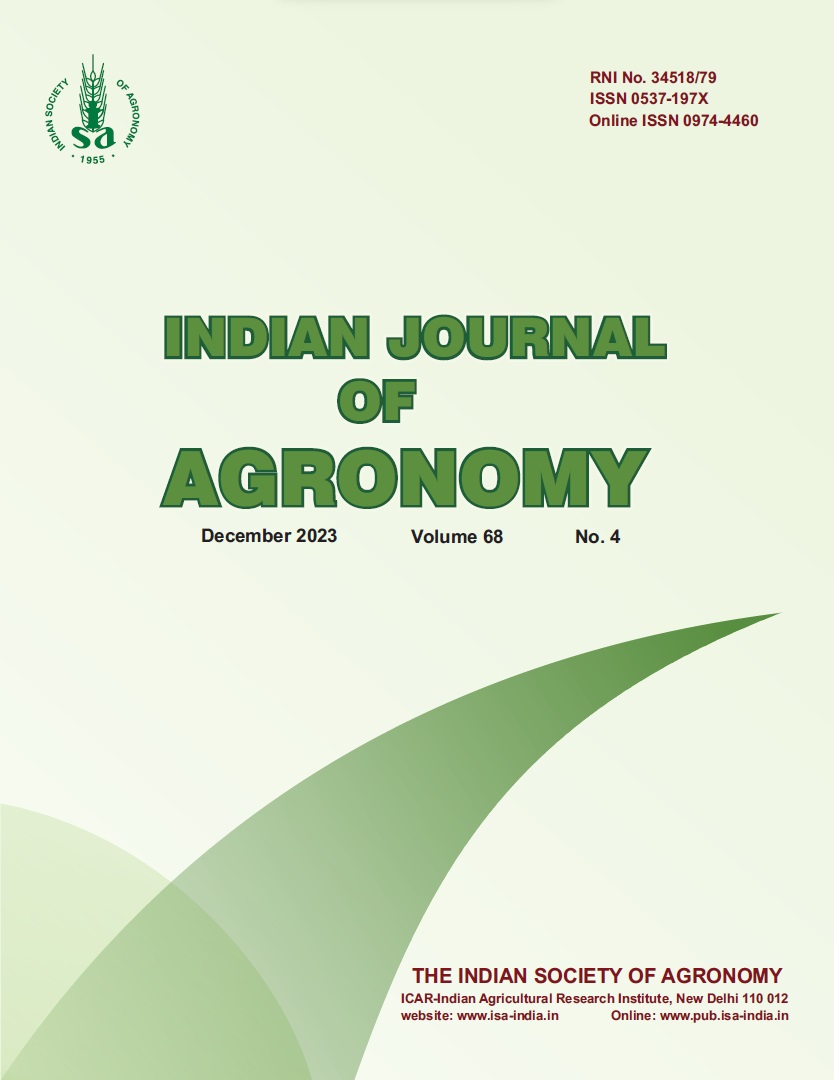Comparative analysis of the growth, yield attributes and grain yield of kharif maize (Zea mays) under varying doses of biochar, fertility levels, and biofertilizer treatments
DOI:
https://doi.org/10.59797/ija.v68i4.5455Keywords:
Biochar, Fertility levels, Maize, Yield attributes, YieldAbstract
A field experiment was conducted during the rainy (kharif) seasons of 2021 and 2022 at the research farm of Acharya Narendra Deva University of Agriculture and Technology, Kumarganj Ayodhya, Uttar Pardesh, to evaluate the effect of graded doses of biochar and fertility levels with and without biofertilizer under partially reclaimed sodic soils on maize (Zea mays L.) performance. The experiment was laid out in randomized block design (RBD) which with 3 replications. Experiment comprised of 8 treatments, viz. T1 , Control; T2 , 100% RDF 100 : 60 : 40 N, P2 O5 and K2 O; T3 , 50% RDF + 2.5 t/ha biochar; T4 , 50% RDF + 2.5 t/ha biochar + ZMB Biofertilizer; T5 , 50% RDF + 2.5 t/ha biochar + ZMB Biofertilizer + Zn; T6 , 100% RDF + 5 t/ha biochar; T7 , 100% RDF + 5 t/ha biochar + ZMB Biofertilizer; T8 , 100% RDF + 5 t/ha biochar + ZMB Biofertilizer + Zn. The study’s comparative analysis revealed the positive effects of applying biochar, optimal fertility levels, and biofertilizers on the yield attributes and grain yield of kharif maize. Notably, treatment T8 showed significant improvements, with a 53% increase in cob length, 34% increase in cob girth, 83% increase in the number of grains per row, 138.4% increase in grain yield, and 134% increase in stover yield compared to the control treatment. These findings demonstrate the successful impact of application of 100% RDF + 5 t/ha biochar + ZMB Biofertilizer + Zn in enhancing various aspects of maize growth and yield, surpassing the outcomes achieved with the control treatment and may be recommended for achieving high-quality maize production in partially reclaimed sodic soils of eastern Uttar Pradesh and comparable agro-ecoregions.References
Abbas, A., Naveed, M., Azeem, M., Yaseen, M., Ullah, R., Alamri, S., Qurrat ul Ain Farooq and Siddiqui, M.H. 2020. Efficiency of wheat straw biochar in combination with compost and biogas slurry for enhancing nutritional status and productivity of soil and plant. Plants 9: 15–16. doi: 10.3390/plants9111516
Abriz, S.F. and Torabian, S. 2018. Effect of biochar on growth and ion contents of bean plant under saline condition. Environmental Science and Pollution Research 1–9. https://doi.org/10.1007/s11356-018-1446-z
Adekiya, A.O., Agbede, T.M., Olayanju, A., Ejue, W.S., Adekanye, T.A., Adenusi, T.T. and Ayeni, J.F. 2020. Effect of biochar on soil properties, soil loss, and cocoyam yield on a tropical sandy loam alfisol. Hindawi The Scientific World Journal 9391630: 1–9.
Agegnehu, G., Srivastava, A.K. and Bird, M.I. 2017. The role of biochar and biochar-compost in improving soil quality and crop performance: A review. Applied Soil Ecology 119: 156–170.
Ali, I., He, L., Ullah, S., Quan, Z., Wei, S., Iqbal, A., Munsif, F., Shah, T., Xuan, Y., Luo, Y., Li, T. and Ligeng, J. 2020. Biochar addition coupled with nitrogen fertilization impacts on soil quality, crop productivity, and nitrogen uptake under double-cropping system. Food Energy Security 9: e208. doi: 10.1002/fes3.208
DACNET. 2022. Directorate of Economics and Statistics, Ministry of Agriculture and Farmers Welfare, Govt of India. https://eands.dacnet.nic.in/PDF/Agricultural%20Statistics%20at%20a%20Glance%20-%202021%20(Hindi%20version).pdf
Faloye, O.T., Ajayi, A.E., Alatise, M.O., Ewulo, B.S. and Horn, R. 2019a. Nutrient uptake, maximum yield production, and economic return of maize under deficit irrigation with biochar and inorganic fertiliser amendments. Biochar 1: 375–388. doi: 10.1007/s42773-019-00032-3
Faloye, O.T., Alatise, M.O., Ajayi, A.E. and Ewulo, B.S. 2019b. Effects of biochar and inorganic fertiliser applications on growth, yield and water use efficiency of maize under deficit irrigation. Agricultural Water Management 217: 165–178. doi: 10.1016/j.agwat.2019.02.044
Gudade, B.A., Malik, G.C., Das, A., Babu, S., Banerjee, M., Kumar, A., Singh, R. and Bora, S.S. 2022. Performance of French bean crop as influenced by biochar levels and INM practices in acid Inceptisol of Meghalaya. Annals of Agricultural Research 43(2): 84–89.
Majid M.A., Islam, M.S., EL-Sabagh, A., Hassan, M.K., Saddam, M.O., Barutcular, C.D. Ratnasekera, D. and Abdelaal, K.A. 2017. Influence of varying nitrogen levels on growth, yield and nitrogen use efficiency of hybrid maize (Zea mays). Journal of Experimental Biology and Agricultural Sciences 5(2): 134–142.
Razzaghi, F., Obour, P. B. and Arthur, E. 2020. Does biochar improve soil water retention? A systematic review and meta-analysis. Geoderma 361: 114055. doi: 10.1016/j.geoderma.2019.114055
Yohanes, P.S., Adnyana, I.M., Nengah, I., Subadiyasa, N. and Merit, I.N. 2015. Effect of dose biochar bamboo, compost, and phonska on growth of maize (Zea mays L.) in dryland. International Journal Advanced Science Engineering Information and Technology 5(6): 433–439.
Zhang, X., Qu, J., Li, H., La, S., Tian, Y. and Gao, L. 2020. Biochar addition combined with daily fertigation improves overall soil quality and enhances water fertilizer productivity of cucumber in alkaline soils of a semi-arid region. Geoderma 363: 114170. doi: 10.1016/j.geoderma.2019.114170
Zheng, J., Han, J., Liu, Z., Xia, W., Zhang, X. and Li, L. 2017. Biochar compound fertilizer increases nitrogen productivity and economic benefits but decreases carbon emission of maize production. Agriculture Ecosystem and Environment 241: 70–78. doi: 10.1016/j.agee.2017.02.034






